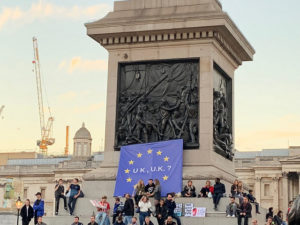Brexit: what a second referendum could look like
 How to formulate the questions
How to formulate the questions
Updated 16.11.2018
Big demonstration on Saturday calling for a second referendum1 on the result of the negociation with the EU, including the possibility of staying a member of the EU. But how could this happen?
In Britain, a referendum can only be called by an act of Parliament2. So to be realistic, the call for a referendum has to suit the needs of the various sides in order to be proposed and find a majority in Parliament: the Government, the Brexiteers, the Remainers (both of them in their various stripes).
There is a way forward (assuming an agreement will be reached by the end of the year between the Government and the EU Council – update: it has been done on 14.11.2018), which I can suggest loosely following the way we deal in Switzerland with a ballot on a 3-way question3.
First (main) question:
- Do you accept the Withdrawal Agreement: Yes or No.
Hypothetical question if the majority to the first question is No (choose only one):
- Should Britain leave the European Union on 29 March 20194 without a withdrawal agreement?
OR
- Should Britain remain a member of the European Union (withdrawing the Art. 50 leaving the EU notification)?
I understand Theresa May doesn’t want a second referendum, nor do the Brexiteers. I think however that they can be won over if the vote is fair: May has nothing to loose to have the result of a negotiation backed by a popular vote5, and it is very possible she will win; the Brexiteers have a fair way to either vote yes or no to the first question and then choose leaving without an agreement; and the Remainers to either vote no or yes to the first question and then choose remaining in the EU. Update 16.11.2018: If, as it appears, Parliament is in complete meltdown about the way forward (with both Brexiteers and Remainers in total denial that this Withdrawal Agreement is the only one on offer under Art. 50) and neither a new Tory leader nor a Corbyn Government would change that, deferring the decision to the people seems the reasonable thing to do.
I honestly think it is impossible predict the result of such a referendum, but at least it would be a democratic way of sorting the relationship between Britain and the EU.
- People’s Vote is a unfortunate moniker, as if the first referendum wasn’t one. [↩]
- In France, even worse, its more or less a decision by the President – as opposed to Switzerland where a referendum is called mostly by a minority independantly of Parliament and Government. [↩]
- Which is normally a popular initiative, backed by 100’000 citizens, to which the Parliament opposes a counter-proposal: people vote separately Yes or No to the initiative and to the counter-proposal, and if both get a majority of Yes choose which one should be put in force [↩]
- Or at the end of a transition period for practical reasons. [↩]
- And frankly it is much fairer than the usual British answer to this, which is to call for a General Election: bundling the choice between a Tory or a Labour Government with Brexit is a recipe for disaster considering the split of both parties on the issue. [↩]




 S'abonner à ce flux
S'abonner à ce flux S'abonner par email
S'abonner par email
